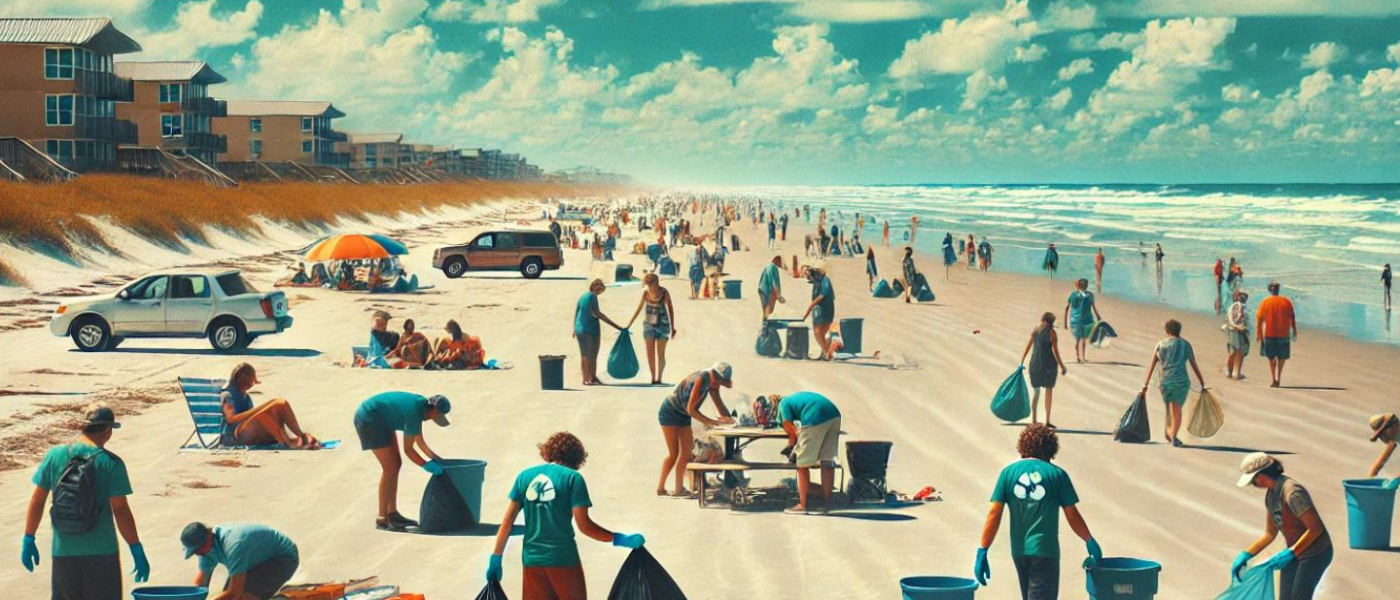Ocean Saving Hacks: Gluing Yourself to Art Isn’t the Answer!
The ocean. Covering over 70% of our planet, it’s like Earth’s ginormous, blue security blanket. It keeps us breathing, keeps the weather in check, and houses all those tasty fish we love to slap on a plate. But thanks to our less-than-stellar habits, marine ecosystems are getting royally screwed. And no, we don’t need to glue ourselves to famous artworks or block traffic to make a difference. How about we try not to wreck everything using more sensible ways? Here are ten easy, yet effective ways to help our oceans without losing your mind. With two other bonus options at the end, so basically I lied its actually 12!
1 – Ditch the Plastic
Plastic is the ocean’s arch-nemesis. Single-use plastics like bags, bottles, and straws love to crash the ocean party and mess everything up. Here’s how to tell them to bugger off:

Reusable Everything: Get yourself some fancy cloth bags and stainless steel or glass bottles. Not only do they make you look like you have your life together, but they’re also saving the ocean one less plastic piece at a time. Carry a reusable bag in your pocket or car for those spontaneous shopping sprees, and keep a cool reusable bottle on you to stay hydrated and smug.
Screw Straws: Straws are for sissies anyway. Unless you’re drinking a smoothie or have a medical need, skip the straw. If you must, go for metal or bamboo. They add a bit of hipster chic to your drinking experience, plus they’re a conversation starter at parties.
Fight the Power: Push for bans on single-use plastics in your area. Attend city council meetings, sign petitions, and get your neighbours involved. Being the local eco-warrior might just land you in the local paper, and who doesn’t want their fifteen minutes of fame?
For more info on reducing plastic use, check out Plastic Pollution Coalition.
Hit the Beach (and Clean It)
Think of beach clean-ups as an excuse to enjoy the sun while pretending to do good. Organizing or joining these shindigs keeps junk out of the ocean and saves marine life from becoming plastic-chomping zombies.

Community Chaos: Drag your friends and family to the beach. Make a day of it. Pack a picnic, some tunes, and gloves. You’ll leave the beach cleaner, feel good about yourself, and maybe even get a tan. Who knew saving the planet could be so fun?
Join the Pros: Hook up with organizations like Keep Britain Tidy. They know their stuff. These events are well-organized, often providing all the supplies you need. Plus, it’s a great way to meet like-minded people who care about the environment and aren’t afraid to get their hands dirty.
Find a beach clean-up near you through Keep Britain Tidy
Eat Fish Responsibly
Overfishing is like the hangover that won’t quit. It screws with fish populations and trashes marine habitats. Do your part by being a picky eater.

Label Detective: Look for labels like MSC (Marine Stewardship Council). They’re the good guys. These labels indicate that the seafood has been harvested sustainably. Sure, it might take a few extra seconds in the grocery store, but your oceanic conscience will thank you.
Variety is the Spice: Mix up your seafood choices. Don’t be that boring tuna-and-salmon-only person. Diversifying your diet helps reduce pressure on any single species. Try something new like sardines or mussels – they’re delicious and more sustainable.
Shop Local: Buy from local, small-scale fishers. Support the little guy and get fresher fish. Visit farmers’ markets or local fishmongers, and ask about their fishing methods. You’ll be supporting sustainable practices and enjoying seafood that didn’t travel halfway around the world to reach your plate.
Learn more about sustainable seafood from the Marine Stewardship Council.
Shrink Your Carbon Buttprint
Carbon emissions are believed to be causing acidification and warming. Regardless of your own views on climate change theory (I am not a believer) I think we can agree that less pollution is definitely better for everyone. You don’t have to be a scientist to understand that less fumes equals cleaner everything. Here’s how to lighten your carbon load:

Public Transport: Buses, trains, carpooling – it’s not just for people who lost their driving license. It’s cheaper, and you get to people-watch. Plus, fewer cars mean fewer emissions. Try biking or walking for short trips. It’s good for your health and the environment.
Energy Savvy: Use energy-efficient gadgets and switch to renewable energy. Solar panels are sexy. Switch to LED bulbs, unplug electronics when not in use, and consider a smart thermostat. Small changes can make a big difference.
Water Smart: Save water to reduce wastewater. Less H2O down the drain means less crap in the ocean. Fix leaks, install low-flow fixtures, and only run dishwashers and washing machines with full loads. You’ll save water and money.
For tips on reducing your carbon footprint, visit Carbon Footprint.
Use Fewer Toxic Chemicals
Household chemicals often end up in the sea, causing all sorts of marine mayhem. These chemicals don’t just vanish once they leave your home; they end up in rivers, lakes, and eventually the ocean, wreaking havoc on marine life and ecosystems.

Go Natural: Use organic products in your home. Homemade cleaners using vinegar, baking soda, and essential oils work wonders and smell divine. Organic gardening methods keep your plants happy without poisoning the planet. Swap out chemical-laden cleaners for simple, natural alternatives that are just as effective. Your home will smell fresher, and you’ll reduce the toxic load entering our waterways.
Dispose Properly: Don’t be a tosser. Get rid of hazardous materials at designated drop-off points. Batteries, paint, and electronic waste shouldn’t go in the regular trash. Check with your local waste management for proper disposal sites. It’s a little extra effort that goes a long way. Proper disposal prevents these harmful substances from leaching into the soil and water, protecting the environment and human health.
For more info on safer alternatives, check out Environmental Working Group.
Back the Marine Crusaders
There are loads of organizations fighting to save our seas. Give them a hand – or a few quid. These groups work tirelessly to protect marine life, restore habitats, and raise awareness about the issues facing our oceans. By supporting them, you amplify their efforts and contribute to meaningful change.

Cash is King: Donate to reputable marine conservation organizations. They need funds to keep doing their vital work. Even a small donation can make a big difference. Whether it’s a one-time contribution or a monthly pledge, your money helps fund research, advocacy, and on-the-ground conservation projects.
Time is Money: Volunteer your time and skills. Be a hero. Whether it’s data entry, social media, or fieldwork, there’s always something you can do to help. Volunteering not only supports these organizations but also gives you a sense of purpose and community. Plus, it’s a great way to learn more about marine conservation and meet like-minded people.
Consider supporting groups like Sea Shepherd, Oceana, and The Marine Conservation Society.
Plant Some Green
Trees and native plants help stop soil erosion and runoff, keeping the ocean cleaner. They act as natural barriers, preventing pollutants from entering waterways and ultimately the ocean. Plus, they provide habitat for wildlife, enhance biodiversity, and contribute to the overall health of the ecosystem.

Get Involved: Join tree-planting events and support reforestation projects. Trees absorb CO2, provide habitat, and help prevent soil erosion. Reforestation projects often need volunteers for planting, maintenance, and monitoring. Plus, it’s a great way to spend a day outdoors. Participating in these events is not only beneficial for the environment but also a fantastic opportunity to connect with your community and make new friends.
Gardening Goals: Plant native species in your garden to help local ecosystems. Native plants require less water and maintenance, and they provide habitat for local wildlife. Create a rain garden to manage stormwater runoff, or plant a butterfly or bee garden to support pollinators. Incorporating native plants into your landscaping helps maintain the natural balance and beauty of your local area, and it’s a rewarding way to contribute to environmental conservation.
For more on reforestation projects, visit One Tree Planted.
Chill on the Fertilizers
Overusing fertilizers and pesticides turns our oceans into toxic soup. These chemicals wash off into streams, rivers, and eventually the ocean, causing nutrient pollution that leads to harmful algal blooms and dead zones. Dial it back to protect marine life and water quality.

Go Organic: Use organic fertilizers and natural pest control methods. The bugs won’t mind. Composting kitchen scraps creates nutrient-rich soil, and natural pest deterrents like neem oil or diatomaceous earth keep your garden healthy. Organic fertilizers release nutrients slowly, promoting steady plant growth without the risk of chemical runoff. Plus, organic pest control methods are safer for you, your pets, and beneficial insects like bees and ladybugs.
Buffer Zones: Create vegetative buffer zones around water bodies to soak up the nasty stuff. Planting trees, shrubs, and grasses along waterways helps absorb excess nutrients and pollutants before they reach the ocean. It’s a simple yet effective way to protect water quality. These buffer zones also provide habitat for wildlife and can enhance the aesthetic appeal of your property. By implementing these zones, you’re creating a natural barrier that filters runoff and prevents erosion, contributing to a healthier aquatic environment.
Learn more about sustainable gardening from Gardener’s Supply Company.
Be a Marine Resource Tightwad
Use marine resources wisely so future generations don’t end up with an ocean full of jellyfish and regrets. Sustainable use of these resources ensures that marine ecosystems remain productive and resilient.

Tourist Trap: Practice eco-friendly tourism. No touching the coral, no harassing the wildlife. Choose tour operators that follow sustainable practices, avoid single-use plastics, and respect local ecosystems. Snorkel responsibly, keep a safe distance from marine animals, and never take souvenirs from the sea. Eco-friendly tourism supports conservation efforts and helps preserve the natural beauty and biodiversity of marine environments for future generations.
Mindful Buying: Choose products that don’t exploit marine resources. Be a conscious consumer. Avoid products made from endangered species or unsustainable materials. Support companies that prioritize sustainability and transparency in their supply chains. Look for certifications like Fair Trade, Rainforest Alliance, or B Corp, which indicate ethical and environmentally responsible business practices. By making informed choices, you can reduce your impact on marine ecosystems and support industries that are working to protect them.
For responsible tourism tips, check out Sustainable Travel International.
Shout it from the Rooftops
Spread the word about ocean conservation. Educate others and advocate for change. Raising awareness is key to driving collective action and influencing policy decisions.

Social Savvy: Use your social media platforms to spread the gospel of marine conservation. Share articles, infographics, and success stories. Engage with your followers by discussing issues and solutions, and encourage them to take action. Start or join online campaigns, use relevant hashtags, and tag organizations to amplify your message. Your voice can reach a global audience and inspire others to join the cause.
Legislative Love: Support laws and regulations that protect marine environments. Vote for the ocean. Write to your representatives, join advocacy groups, and participate in campaigns for stronger environmental policies. Your voice matters. Attend public hearings, sign petitions, and engage in peaceful protests to show your support for marine conservation initiatives. By participating in the political process, you can help shape policies that safeguard our oceans and ensure a sustainable future for all.
Just Stop Oil: Hurting the Cause?
Alright, let’s talk about Just Stop Oil, hard not to as they seem to have stolen the spotlight from nature. I get it – the planet’s on fire, the seas are rising, and something needs to be done. Their hearts are in the right place, but their methods? Not so much. When protesters glue themselves to famous artworks or block major roads, it grabs headlines, sure. But does it change minds, or just piss people off?

By being so disruptive, they risk turning the public against environmental movements. Instead of raising awareness, they might just be giving mindless morons more ammunition. It’s like they’re shooting themselves in the foot while trying to run a marathon.
For a more balanced approach to saving our seas and planet, check out my earlier tips in this article. They’re effective and won’t get you arrested! For more about my views on Just Stop Oil and gang, click here
Join the fashion revolution!
Check out amazing initiatives that find ways to use the plastic waste we have created and turn it into a reusable fashion product, such us one we personally back, Valorous. Check out a previous post on them by clicking here.

Final notes!
Saving our seas doesn’t mean turning your life upside down or gluing yourself to a Van Gogh. Even small actions can make a huge difference. Reduce plastic use, clean up beaches, eat seafood sustainably, cut down on carbon emissions, use fewer chemicals, support conservation efforts, plant trees, limit fertilizer use, conserve marine resources, and spread the word. Every little bit helps. So, let’s get cracking before our oceans turn into one giant puddle of regret. Cheers to a healthier ocean and a brighter future!









